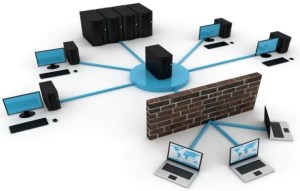You might have probably heard about firewall computing and how important it is in security protection, but do you know how it works and some of its functions? To be frank, many people don’t. Maybe you fall among the category and that is the major reason you bump on this post, you will surely get a little bit of insight when you read to the end.
Firewall In Computer: How It Works
A firewall can be a software or a piece of hardware that sits between a computer (or local network) and another computer (such as the internet), which controls the incoming and outgoing network traffic. Without a firewall, there will be no limitations in network interactions because simply anything goes. But when a firewall is installed, the rules determines which traffic is allowed through and which is blocked.

Why Computers Uses Firewalls
Presently, most computer users now use routers at home to share their internet connections between multiple devices. However, there was a period when users plugged their computer’s Ethernet cable directly into their cable or DSL modem, to connect their computer to the internet.
Also read:Shortcut Keys in Computer For Executing Commands and Special Characters
A computer connected directly to the internet has a publicly addressable IP (Internet Protocol). This simply means that anyone on the internet can reach it. Any network services you have running on your computer, e.g Windows file and printer sharing, remote desktop, and other features, would be accessible to other computers on the internet too.
The original version of Windows XP did not contain a firewall. The combination of having services designed for local networks, no firewall, and computers connected directly to the Internet led to many Windows XP computers becoming infected within minutes of being connected directly to the Internet.
Must read: KRACK Attack: How To Protect Your Device From This Deadly Wi-Fi Hack
As a result of the above ordeal, the Windows Firewall was then introduced in Windows XP Service Pack 2, and it finally enabled a firewall by default in Windows. This made those network services that were formerly accessible become isolated from the internet. Instead of accepting all incoming connections, a firewalled system drops all incoming connections unless it is specifically configured to allow them.
This prevents people on the internet to connect to local network services on your computer. It also controls access to network services from other computers on your local area network. .This is the major reason you are asked “what type of network it is” when you are trying to connect to one in Windows. If you are connecting to a Home network, the firewall will allow access to these services. On the other hand, if you are connected to a public network, it will deny access.
Even when a network service itself is configured not to allow connections from the internet, there is a possibility that the service has a security flaw, and a specifically crafted request could allow an attacker to run arbitrary code on your computer. A firewall can prevent this by serving as a block that prevents incoming connections from even reaching these potentially vulnerable devices.
Must read: Tips For Choosing The Best VPN For Your Online Needs and Privacy
Some Other Functions Of Firewall
A firewall’s main security function for home users is to block unsolicited incoming network traffic, but they can also do much more than that. This because as the firewall is sitting between these two networks (your computer and another computer or the internet), it can analyze all traffic reaching or leaving the network and decide what to do with it. For instance, a firewall can also be configured to block certain types of outgoing traffic or could log suspicious traffic (or all traffic).
A firewall could also have a variety of rules that allow and deny certain types of traffic. For example, it can only allow connections to a server from a specific IP address, dropping all connection requests from elsewhere for security.
Firewalls can be a piece of software running on your laptop (like the ones included with Windows) or dedicated hardware in a corporate network.
Corporate firewalls can analyze outgoing traffic to ensure that no malware is communicating through the network, monitor employee’s network use, and also filter traffic. For example, a firewall can be configured to only allow web browsing traffic through it, blocking access to other types of applications.
If you are having a router at home, it actually functions as a sort of hardware firewall due to its NAT (Network Address Translation) feature. This prevents unsolicited incoming traffic from reaching your computers and other devices behind your router.








No Comment! Be the first one.